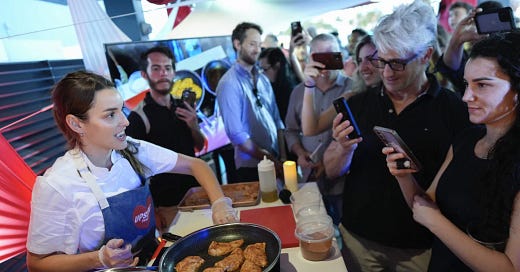Vegan opposition to cultivated meat is deeply silly
Sometimes I can’t help but imagine what animal advocates of the future will think of their present-day counterparts who oppose cultivated meat. For those who don’t know, cultivated meat is grown from animal cells, without slaughter. I suspect they will be baffled by such opposition and view it as fundamentally unserious.
This came to mind again recently, when the Vegan Society announced it couldn’t support cultivated meat, which it viewed as insufficiently vegan. There was a good deal of hedging in the society’s statement, leaving room for an eventual change in position. Still, while disappointed to read the news, I wasn’t surprised.
For a great number of contemporary activists, veganism is a lifestyle based on personal purity rather than a political perspective which seeks to minimize harm to nonhuman creatures. I try not to impugn the motives of others, but it’s often difficult for me to understand vegan opposition to cultivated meat any other way.
Activists skeptical of cellular agriculture often note cultivated meat is not completely independent of animal inputs. That’s true. I’m not a scientist, but my understanding is fetal bovine serum has been replaced as a growth medium by large industry players and eventually there may be no need for an initial animal biopsy.
Zooming out, however, this objection ignores the reality no option is truly free from violence against nonhumans. Millions of animals are killed in the process of growing and harvesting plants, for instance. Politics, consumption, and life as a whole requires selecting from imperfect choices. It’s frustrating, but unavoidable.
At this point, critics of cultivated meat might say there are already plant-based options that mimic the taste of flesh to varying degrees. Unfortunately, for significant portions of the public, the existing options aren’t good enough or cheap enough. Cellular agriculture seeks to create an identical product to slaughtered meat.
Vegan opponents of cultivated meat will argue such a concession to the public reflects an unwillingness to challenge speciesism, which should apparently be valued above all other things, including saving lives. But, in my view, this gets things backwards. As Marxists would say, base determines superstructure.
My understanding of academic theory is limited. However, I think this perspective is more right than wrong. Speciesism doesn’t primarily create animal exploitation. Animal exploitation primarily creates speciesism. In undermining animal exploitation with cellular agriculture, we undermine speciesism.
In my reading of late 19th-century and early 20th-century vegetarianism, I dimly recall some animal activists condemning the primitive meat analogues developed in that era. In their view, if memory serves, these were an unnecessary capitulation to flesh-eaters. After all, there were less varnished options available.
I imagine activists of today, with an ounce of practicality, would view those who condemn veggie burgers and solely advocate for consuming plants in close to their original form as deeply silly and harmful to animal interests. I suspect future activists will think of those now who oppose cultivated meat similarly.
Cellular agriculture probably won’t end animal agriculture on its own. But it will eventually put nonhuman activists in a much more favorable position to do so. Even low adoption rates of cultivated meat could save billions of our fellow creatures. We should do everything possible to accelerate this technology’s development.


